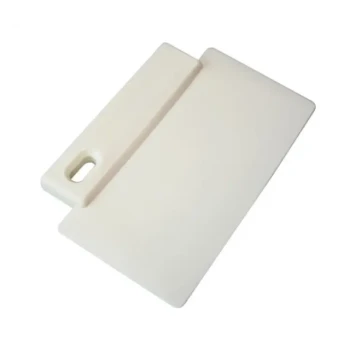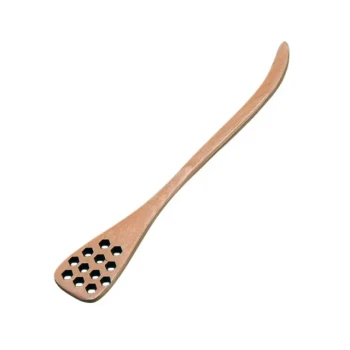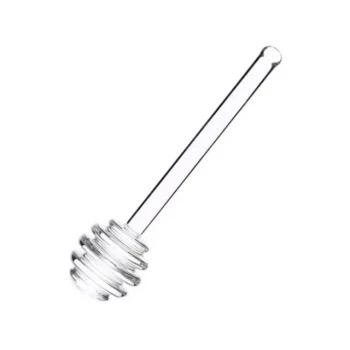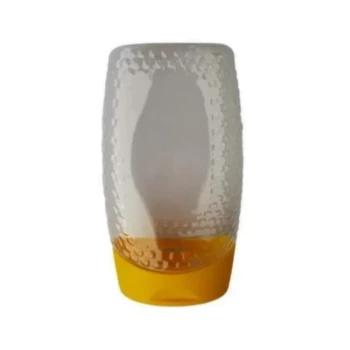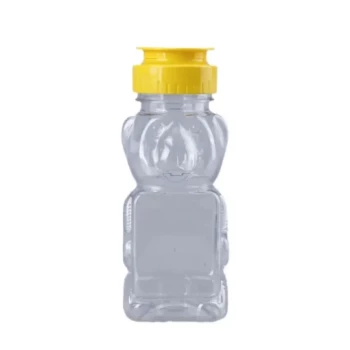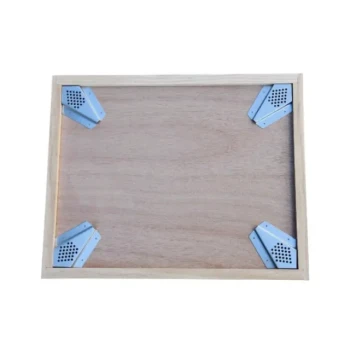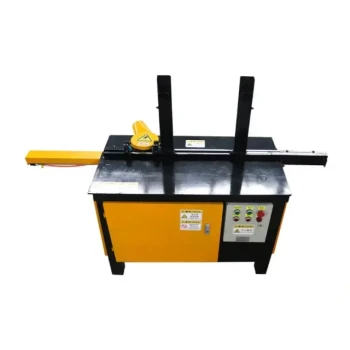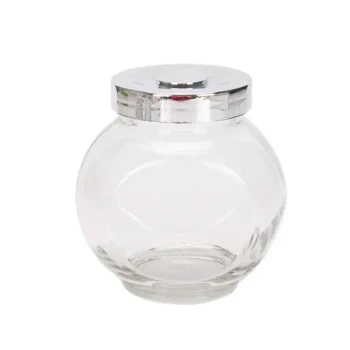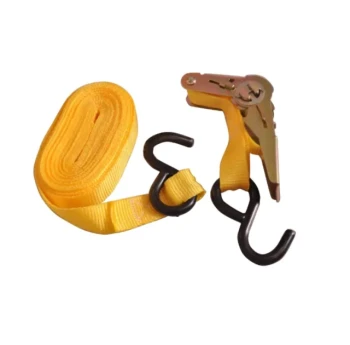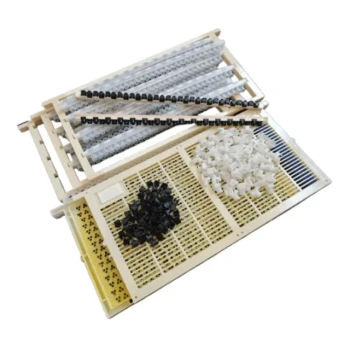The best time to extract honey is during the late summer, typically in August or September, after the primary nectar flow has ended. This timing ensures the bees have had ample opportunity to produce and "cure" the honey by reducing its moisture content, which is crucial for long-term storage.
While a calendar date provides a general guideline, the true signal for extraction is not the month, but the condition of the honeycomb itself. Your primary goal is to harvest "ripe" honey without compromising the colony's ability to survive the winter.
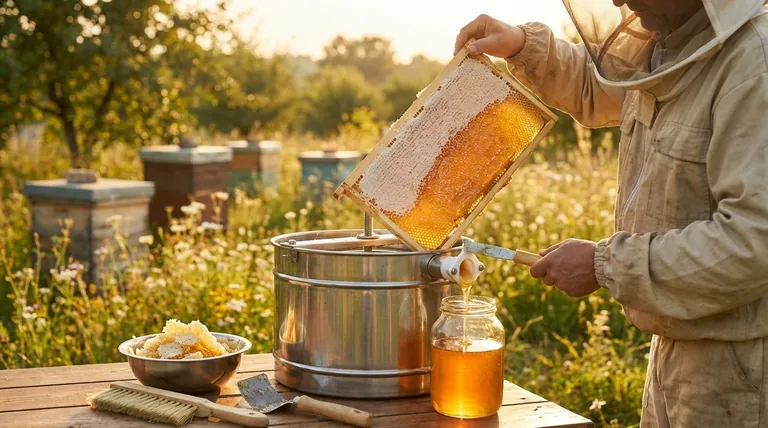
Beyond the Calendar: Key Indicators for Harvest
Timing your honey harvest is a balance. You must evaluate the readiness of the honey and the health of your hive. Relying on visual cues from the comb is far more accurate than simply following a calendar.
The "80% Capped" Rule
A frame of honey is ready for harvest when at least 80% of the cells are capped with a fresh layer of white beeswax. This wax cap is a sign that the bees have finished their work on that cell.
They cap the honey only after they have reduced its moisture content to around 18%. This process, known as curing, is essential to prevent the honey from fermenting in storage.
Verifying Ripeness
If you have frames with significant portions of uncapped honey, you can perform a simple "shake test." Hold the frame horizontally over the open hive and give it a firm shake.
If nectar or thin honey drips out, it is not yet cured and has a high moisture content. That frame should be left for the bees to finish. Cured honey is viscous and will remain in the cells when shaken.
Assessing the Colony's Winter Needs
Never take all the honey. A hive needs significant honey stores to survive the winter, with a typical colony requiring anywhere from 60 to 90 pounds, depending on your climate's severity.
Always inspect the lower brood boxes to ensure they are heavy with honey before you even consider harvesting from the upper honey supers. Your first responsibility is to the health and survival of the colony.
The Extraction Process: A Step-by-Step Overview
Once you've determined your honey is ready, the extraction process begins. Having a dedicated, clean space is essential for a smooth operation.
Step 1: Remove Bees from the Supers
Before bringing frames indoors, you must clear them of bees. This is often done with a leaf blower on a low setting to gently push them off the frames or by using a "bee escape" board 24 hours prior, which allows them to leave the super but not re-enter.
Step 2: Uncap the Honeycomb
Each capped cell must be opened. This is done with a special heated knife or an uncapping scratcher, which slices or scrapes off the thin wax cappings to expose the honey underneath.
Step 3: Extract the Honey
The most common method uses a centrifugal extractor, a large drum that spins frames and pulls the honey out with centrifugal force.
Simpler, lower-cost methods include the crush and strain technique, where the entire comb is crushed and the honey drains through filters, or harvesting cut comb, where squares of the wax comb are cut out and packaged directly.
Step 4: Filter and Settle
Extracted honey contains wax particles and other small debris. It must be filtered through progressively finer strainers or cheesecloth to achieve a pure, clear final product. Allowing the honey to sit for a day or two also lets air bubbles and remaining impurities rise to the top to be skimmed off.
Understanding the Trade-offs
The timing and method of your extraction involve critical trade-offs that impact both your honey quality and your bees' health.
The Risk of Harvesting Too Early
Harvesting uncapped, "unripe" honey is the most common mistake. Honey with a moisture content above 20% will ferment in storage, ruining your entire harvest. It is always better to wait than to extract too soon.
The Danger of Harvesting Too Late
Waiting too long into the autumn can also present problems. Bees may begin consuming the honey stores you intended to harvest. Furthermore, a late-season disruption can make it difficult for the colony to reorganize and prepare for winter.
The Temperature Factor
Honey is highly viscous. Extracting in a cold environment is extremely difficult, as the honey will not flow easily from the comb. An ambient temperature of 80-90°F is ideal to make the honey flow smoothly, maximizing your yield and minimizing effort.
Making the Right Extraction Decision
Your approach should be guided by your specific goals as a beekeeper.
- If your primary focus is maximizing honey quality: Wait until frames are at least 80-90% capped and harvest during a warm spell in the late summer to ensure low moisture and easy extraction.
- If your primary focus is colony health: Always confirm the brood boxes have ample winter stores before taking any honey from the supers, even if it means a smaller harvest for you.
- If your primary focus is simplicity and low cost: Choose the crush-and-strain or cut-comb method, which requires no expensive machinery but sacrifices the reusable drawn-out comb.
Ultimately, a successful honey harvest is a partnership with your bees, timed to benefit both the hive and the beekeeper.
Summary Table:
| Key Harvest Factor | Optimal Timing & Indicator | Critical Consideration |
|---|---|---|
| Primary Season | Late Summer (August/September) | Ensures nectar flow has ended and honey is cured. |
| Frame Readiness | At least 80% of cells are capped with wax. | Capping indicates moisture content is below 18%, preventing fermentation. |
| Colony Health | Before harvesting, ensure lower brood boxes are heavy with honey. | A hive needs 60-90 lbs of honey to survive winter. |
| Ambient Temperature | 80-90°F (27-32°C) for extraction. | Warm honey flows easily, maximizing yield and minimizing effort. |
Ready for a Smoother, More Productive Harvest?
Whether you're a commercial apiary or a beekeeping equipment distributor, the right supplies are critical for efficiency and honey quality. HONESTBEE supplies the durable, high-performance equipment you need.
We help our partners succeed by providing:
- Reliable Extractors & Uncapping Tools: For maximum yield and purity.
- Essential Harvesting Supplies: From filters to storage tanks.
- Wholesale-Focused Expertise: Tailored solutions for commercial operations.
Let's discuss your needs and how we can support your business. Contact our team today to get the right equipment for your harvest.
Visual Guide
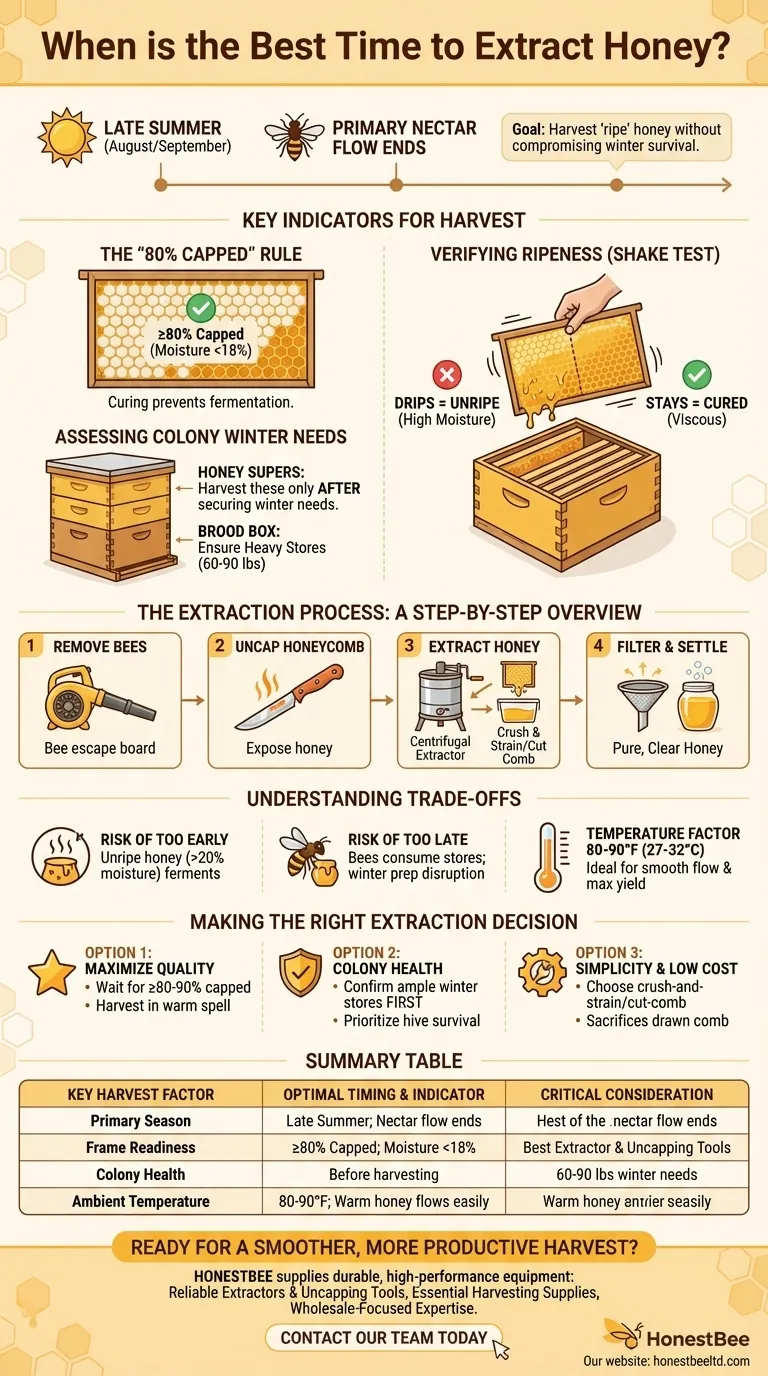
Related Products
- 10L Stainless Steel Electric Honey Press Machine
- Stainless Steel Honey Press Wax Press with Tank
- Electric Flatting and Embossing Machine with Tray for Beekeeping
- Stainless Steel Manual Honey Press with Guard for Pressing Honey and Wax
- Honey Wax Separating Wax Press with Metal Screw Wax Separator Machine
People Also Ask
- What are the material advantages of using a stainless steel honey press? Ensure Pure, Lead-Free Honey Extraction
- How should a honey press be cleaned after use? Essential Hygiene & Wax Recovery Tips
- What are the benefits of the screw design in a stainless steel honey pump? Preserve Honey Quality and Integrity
- What are the main differences between centrifugal extractors and honey presses? A Guide for Commercial Apiaries
- How does pressed honey compare to extracted or crush-and-strain? Unlock the Full Flavor of the Hive





